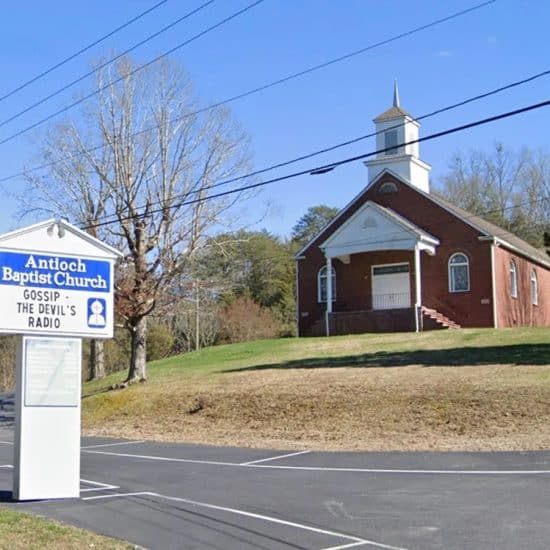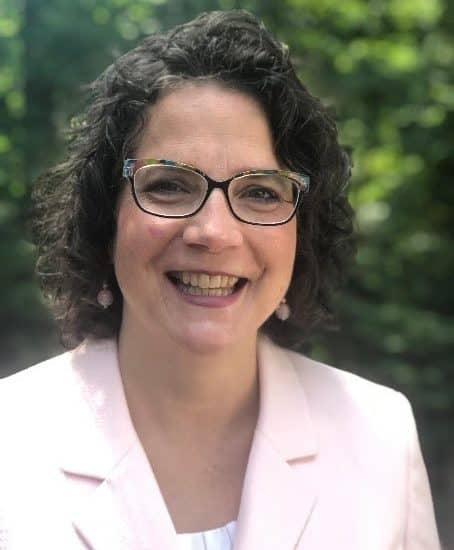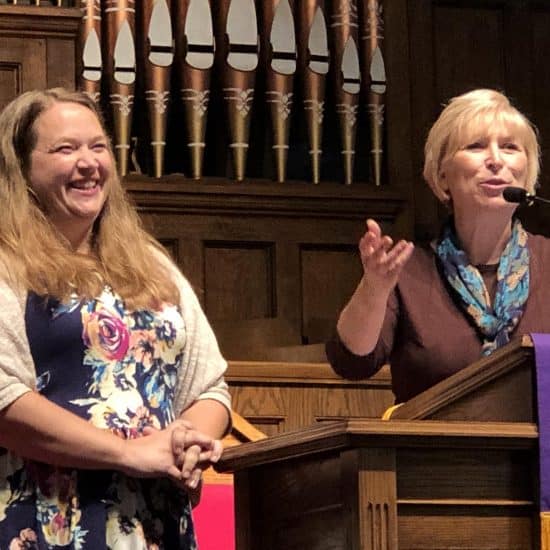CHARLOTTE, N.C. (ABP) — With the Cooperative Baptist Fellowship unable to appoint fully funded missionaries for several years and facing the possibility of calling field personnel home unless gifts to its annual Offering for Global Missions increase, CBF churches continue to fund Southern Baptist Convention missionaries by allowing members to designate gifts to the Lottie Moon Christmas Offering, a former executive director of Woman's Missionary Union said June 25.
Receiving an annual Courage Award from the William H. Whitsitt Baptist Heritage Society during the CBF General Assembly held June 23-26 in Charlotte, N.C., Carolyn Weatherford Crumpler, a past CBF moderator who led the national WMU from 1974 until 1989, recalled being invited to talk about missions at a church in that very state.
"They said, 'Now Carolyn, remember we are not Southern Baptists. We are Cooperative Baptist Fellowship. We want you to talk about CBF missions,'" she recalled. "I walked into church on Sunday morning and there was this big sign: 'Lottie Moon Christmas Offering.'"
"That was before WMU had copyrighted the name," she said. "I walked in and said, 'You told me this was not going to be Lottie Moon.' They said, 'Well they are not going to take that away from us too.'"
"I said, 'Yes, but if you write 'Lottie Moon Christmas Offering' on your check, it's going to go to the Foreign Mission Board,'" using the name at the time for what was later renamed the SBC International Mission Board.
Crumpler said she suspects fund-raising efforts for CBF missions have been hampered by not having a counterpart to WMU, a women's auxiliary to the SBC that has helped raise billions of dollars by promoting SBC home and foreign mission offerings since 1888.
"The Cooperative Baptist Fellowship has excellent mission material, but we don't use it that much and we don't emphasize the offering," she said. "The important thing to know about WMU is that WMU said, 'We will publish CBF's materials for you,' and when it was found out by the big folks in the Southern Baptist Convention, they said, 'Uh, uh, can't do it. You can't publish that material.'"
Crumpler is the third woman to receive the award first presented in 1993 honoring the legacy of a president of Southern Baptist Theological Seminary forced to resign in 1899 for reasons of academic integrity. Bill Wilson, the Whitsitt Society's incoming president, introduced her as "remarkable hero" known for a "smile with a steel backbone."
Crumpler said much of her career was framed during debates about the role of women in the church and home.
When she enrolled at New Orleans Baptist Theological Seminary to prepare for her childhood dream of becoming a missionary, she said she wanted to take classes in the School of Theology but could not because it was closed to women.
"So I went to the School of Religious Education," she said. "But you know, I did take all of my electives in the School of Theology. It's too bad that I didn't take homiletics, because I have been preaching ever since."
After it became apparent she would not be able to qualify as a missionary for health reasons — high blood pressure — she refocused her energies toward WMU work in two states and later the national headquarters. She faced occasional skirmishes — like when upon her election as national WMU executive in 1974 she answered reporters questions about her views on the feminist movement with a line intended to express she supported both sexes that came out "I'm not a feminist; I'm a humanist." But overall all, Crumpler said she was treated fairly equally as the lone woman on an interagency council composed of SBC agency heads, until the 1980s, when the SBC became less willing to support women in ministry.
"The convention resolutions on women became more specific, the criticism of vocal women more stringent," she said. "Unmarried women leaders of WMU were falsely labeled as lesbians."
Crumpler said she often encountered opposition in public speaking engagements, while sharing the platform with men.
She recalled one state evangelism meeting where the presiding pastor said, "Brethren, my Bible says let the women keep silent in the church. If they have questions let them ask their husbands." After being introduced as the next speaker, Crumpler related: "I stood, I turned to him and rather courageously said, 'Brother, my Bible says the same thing, but I don't have a husband.' The congregation laughed and applauded and I preached."
At another state convention meeting where she was the final speaker, the state executive warned her he had gotten a lot of objection for letting her to speak in such a prominent time slot. "I said 'That's OK. That doesn't matter to me,'" she said.
Then the speaker before her preached an entire message about "foolish women" from a single verse, Matthew 28:1, which describes Mary Magdelene and another Mary going out to see Jesus' tomb.
"You know what I did?" she said. "When I started speaking I went on down a few more verses when Jesus spoke to the women, and I said, 'Jesus spoke first to the women and said, "Go tell."'
Crumpler said WMU acted courageously in 1982, when it convened a meeting to discuss all the things that were being done against women in ministry in Southern Baptist life. The result was formation a year later of Southern Baptist Women in Ministry. The group deleted "Southern" in 1993 and is now known as Baptist Women in Ministry. "And it's a thriving group," she said.
Crumpler said one of her most courageous steps was moving from "the platform to the parsonage" in 1989 by retiring from WMU at age 59 and marrying Joe Crumpler, a widowed pastor in Cincinnati. She said one of the things she learned from the marriage, her first, was who was responsible for all the church-potluck meals she had enjoyed while visiting churches over the years.
Not long after the couple returned to Ohio from their wedding trip, Crumpler said she was approached by Daniel Vestal, today executive coordinator of the Cooperative Baptist Fellowship but at the time a pastor running for president of the Southern Baptist Convention, about joining him as a candidate for vice president in 1990 at New Orleans.
"We ran, and we were defeated," she said. "We knew that we were going to win. We had planned this wonderful breakfast the next day to celebrate our winning, and you know what happened. The next morning we decided we were going to meet in Atlanta, and we were going to decide what we were going to do. You remember the meeting in Atlanta, and now we are getting ready to celebrate the 20th anniversary of the Cooperative Baptist Fellowship."
Crumpler said both she and her predecessor at WMU, Alma Hunt, who died in 2008, were "kind of ostracized for a while" by WMU for joining the CBF, because "they were warned not to participate with us." Later, she said, her successor at WMU, Dellanna O'Brien, who also died in 2008, reopened doors by apologizing for taking "advice from people who didn't know what they were talking about."
Crumpler said WMU still maintains its auxiliary status, such as when it refused to follow the convention's lead in pulling out of the Baptist World Alliance in 2004.
-30-
Bob Allen is senior writer for Associated Baptist Press.



